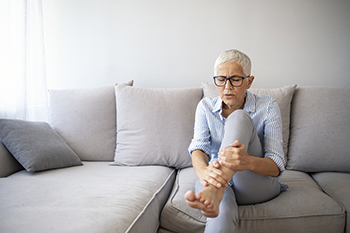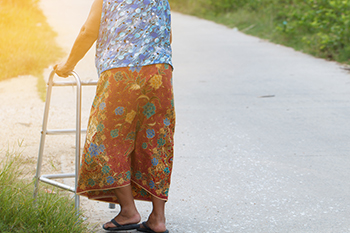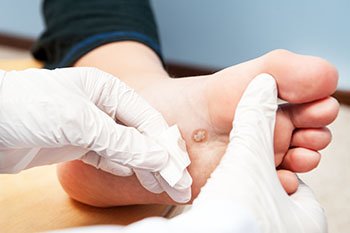Connect With Us
Blog
Items filtered by date: April 2022
Facts About Arthritis

Arthritis has long been considered an ailment of the elderly, but a variety of other people are actually experiencing some form of arthritis, even children. Arthritis is an inflammation of the joints that produces pain, swelling, and muscle stiffness that often affect the toes, feet, and ankles. Among the causes are the deterioration of cartilage that then endangers the bones, an attack of the autoimmune system, smoking, previous injury, over-exercising or repetitive stress, serious infections, and heredity. There are many types of arthritis, including rheumatoid, psoriatic, osteoarthritis, fibromyalgia, gout, ankylosing spondylitis, lupus and juvenile. The most easily recognizable symptoms of arthritis include pain and swelling in the joints, redness, difficulty in walking or moving the joints, stiffness in the morning, and tenderness to the touch. Many treatments are available that allow you to live with this condition. If you think you or your child may have arthritis, it is a good idea to contact a podiatrist for a complete examination and diagnosis, as well as possible treatment plans.
Arthritis can be a difficult condition to live with. If you are seeking treatment, contact Imaze Marian Davis, DPM from Marian Davis, DPM, PA. Our doctor can provide the care you need to keep you pain-free and on your feet.
Arthritic Foot Care
Arthritis is a term that is commonly used to describe joint pain. The condition itself can occur to anyone of any age, race, or gender, and there are over 100 types of it. Nevertheless, arthritis is more commonly found in women compared to men, and it is also more prevalent in those who are overweight. The causes of arthritis vary depending on which type of arthritis you have. Osteoarthritis for example, is often caused by injury, while rheumatoid arthritis is caused by a misdirected immune system.
Symptoms
- Swelling
- Pain
- Stiffness
- Decreased Range of Motion
Arthritic symptoms range in severity, and they may come and go. Some symptoms stay the same for several years but could potentially get worse with time. Severe cases of arthritis can prevent its sufferers from performing daily activities and make walking difficult.
Risk Factors
- Occupation – Occupations requiring repetitive knee movements have been linked to osteoarthritis
- Obesity – Excess weight can contribute to osteoarthritis development
- Infection – Microbial agents can infect the joints and trigger arthritis
- Joint Injuries – Damage to joints may lead to osteoarthritis
- Age – Risk increases with age
- Gender –Most types are more common in women
- Genetics – Arthritis can be hereditary
If you suspect your arthritis is affecting your feet, it is crucial that you see a podiatrist immediately. Your doctor will be able to address your specific case and help you decide which treatment method is best for you.
If you have any questions, please feel free to contact our office located in Miami, FL . We offer the newest diagnostic and treatment technologies for all your foot care needs.
Facts About Arthritis

Arthritis has long been considered an ailment of the elderly, but a variety of other people are actually experiencing some form of arthritis, even children. Arthritis is an inflammation of the joints that produces pain, swelling, and muscle stiffness that often affect the toes, feet, and ankles. Among the causes are the deterioration of cartilage that then endangers the bones, an attack of the autoimmune system, smoking, previous injury, over-exercising or repetitive stress, serious infections, and heredity. There are many types of arthritis, including rheumatoid, psoriatic, osteoarthritis, fibromyalgia, gout, ankylosing spondylitis, lupus and juvenile. The most easily recognizable symptoms of arthritis include pain and swelling in the joints, redness, difficulty in walking or moving the joints, stiffness in the morning, and tenderness to the touch. Many treatments are available that allow you to live with this condition. If you think you or your child may have arthritis, it is a good idea to contact a podiatrist for a complete examination and diagnosis, as well as possible treatment plans.
Arthritis can be a difficult condition to live with. If you are seeking treatment, contact Imaze Marian Davis, DPM from Marian Davis, DPM, PA. Our doctors can provide the care you need to keep you pain-free and on your feet.
Arthritic Foot Care
Arthritis is a term that is commonly used to describe joint pain. The condition itself can occur to anyone of any age, race, or gender, and there are over 100 types of it. Nevertheless, arthritis is more commonly found in women compared to men, and it is also more prevalent in those who are overweight. The causes of arthritis vary depending on which type of arthritis you have. Osteoarthritis for example, is often caused by injury, while rheumatoid arthritis is caused by a misdirected immune system.
Symptoms
- Swelling
- Pain
- Stiffness
- Decreased Range of Motion
Arthritic symptoms range in severity, and they may come and go. Some symptoms stay the same for several years but could potentially get worse with time. Severe cases of arthritis can prevent its sufferers from performing daily activities and make walking difficult.
Risk Factors
- Occupation – Occupations requiring repetitive knee movements have been linked to osteoarthritis
- Obesity – Excess weight can contribute to osteoarthritis development
- Infection – Microbial agents can infect the joints and trigger arthritis
- Joint Injuries – Damage to joints may lead to osteoarthritis
- Age – Risk increases with age
- Gender –Most types are more common in women
- Genetics – Arthritis can be hereditary
If you suspect your arthritis is affecting your feet, it is crucial that you see a podiatrist immediately. Your doctor will be able to address your specific case and help you decide which treatment method is best for you.
If you have any questions, please feel free to contact our office located in Miami, FL . We offer the newest diagnostic and treatment technologies for all your foot care needs.
I Have a Foot Wart - Should I Be Worried?
Warts on the sole of your foot or toes, known as plantar warts or verrucas, are caused by a viral infection of the skin. The virus enters your body through a cut, scrape, or other small opening in the skin and produces one or more grainy, flesh-colored warts with small black dots in the center. Most warts are painless, though some may be uncomfortable if they are located on a weight-bearing area, like the heel or ball of the foot. Fortunately, most plantar warts go away on their own, but this can take quite some time, ranging from months to years. To speed up recovery, you may wish to seek treatment from a podiatrist. It is also a good idea to consult with a podiatrist if you have a medical condition like diabetes or immune insufficiency, which can make plantar warts a more serious concern.
Plantar warts can be very uncomfortable. If you need your feet checked, contact Imaze Marian Davis, DPM from Marian Davis, DPM, PA. Our doctor will assist you with all of your foot and ankle needs.
About Plantar Warts
Plantar warts are the result of HPV, or human papillomavirus, getting into open wounds on the feet. They are mostly found on the heels or balls of the feet.
While plantar warts are generally harmless, those experiencing excessive pain or those suffering from diabetes or a compromised immune system require immediate medical care. Plantar warts are easily diagnosed, usually through scraping off a bit of rough skin or by getting a biopsy.
Symptoms
- Lesions on the bottom of your feet, usually rough and grainy
- Hard or thick callused spots
- Wart seeds, which are small clotted blood vessels that look like little black spots
- Pain, discomfort, or tenderness of your feet when walking or standing
Treatment
- Freezing
- Electric tool removal
- Laser Treatment
- Topical Creams (prescription only)
- Over-the-counter medications
To help prevent developing plantar warts, avoid walking barefoot over abrasive surfaces that can cause cuts or wounds for HPV to get into. Avoiding direct contact with other warts, as well as not picking or rubbing existing warts, can help prevent the further spread of plantar warts. However, if you think you have developed plantar warts, speak to your podiatrist. He or she can diagnose the warts on your feet and recommend the appropriate treatment options.
If you have any questions please feel free to contact our office located in Miami, FL . We offer the newest diagnostic and treatment technologies for all your foot and ankle needs.
I Have a Foot Wart - Should I Be Worried?
Warts on the sole of your foot or toes, known as plantar warts or verrucas, are caused by a viral infection of the skin. The virus enters your body through a cut, scrape, or other small opening in the skin and produces one or more grainy, flesh-colored warts with small black dots in the center. Most warts are painless, though some may be uncomfortable if they are located on a weight-bearing area, like the heel or ball of the foot. Fortunately, most plantar warts go away on their own, but this can take quite some time, ranging from months to years. To speed up recovery, you may wish to seek treatment from a podiatrist. It is also a good idea to consult with a podiatrist if you have a medical condition like diabetes or immune insufficiency, which can make plantar warts a more serious concern.
Plantar warts can be very uncomfortable. If you need your feet checked, contact Imaze Marian Davis, DPM from Marian Davis, DPM, PA. Our doctors will assist you with all of your foot and ankle needs.
About Plantar Warts
Plantar warts are the result of HPV, or human papillomavirus, getting into open wounds on the feet. They are mostly found on the heels or balls of the feet.
While plantar warts are generally harmless, those experiencing excessive pain or those suffering from diabetes or a compromised immune system require immediate medical care. Plantar warts are easily diagnosed, usually through scraping off a bit of rough skin or by getting a biopsy.
Symptoms
- Lesions on the bottom of your feet, usually rough and grainy
- Hard or thick callused spots
- Wart seeds, which are small clotted blood vessels that look like little black spots
- Pain, discomfort, or tenderness of your feet when walking or standing
Treatment
- Freezing
- Electric tool removal
- Laser Treatment
- Topical Creams (prescription only)
- Over-the-counter medications
To help prevent developing plantar warts, avoid walking barefoot over abrasive surfaces that can cause cuts or wounds for HPV to get into. Avoiding direct contact with other warts, as well as not picking or rubbing existing warts, can help prevent the further spread of plantar warts. However, if you think you have developed plantar warts, speak to your podiatrist. He or she can diagnose the warts on your feet and recommend the appropriate treatment options.
If you have any questions please feel free to contact our office located in Miami, FL . We offer the newest diagnostic and treatment technologies for all your foot and ankle needs.
Several Causes of Heel Pain
Heel pain can develop for a variety of reasons that can include plantar fasciitis, heel spurs, Sever’s disease, or an Achilles tendon injury. Many patients with heel pain can manage it when comfortable shoes are worn that have a low heel. Additionally, it is beneficial to practice specific stretches that can help heel pain. An effective stretch is defined as standing on a step and lowering one heel at a time until a gentle pull is felt. It may feel good to roll the bottom of the foot on a tennis ball, and this may help the entire foot to feel good. It is suggested to refrain from wearing high heels or shoes that are pointy, in addition to refraining from standing for long periods of time. If you have heel pain, it is strongly advised that you contact a podiatrist who can determine what the cause may be and begin the correct treatment.
Many people suffer from bouts of heel pain. For more information, contact Imaze Marian Davis, DPM of Marian Davis, DPM, PA. Our doctor can provide the care you need to keep you pain-free and on your feet.
Causes of Heel Pain
Heel pain is often associated with plantar fasciitis. The plantar fascia is a band of tissues that extends along the bottom of the foot. A rip or tear in this ligament can cause inflammation of the tissue.
Achilles tendonitis is another cause of heel pain. Inflammation of the Achilles tendon will cause pain from fractures and muscle tearing. Lack of flexibility is also another symptom.
Heel spurs are another cause of pain. When the tissues of the plantar fascia undergo a great deal of stress, it can lead to ligament separation from the heel bone, causing heel spurs.
Why Might Heel Pain Occur?
- Wearing ill-fitting shoes
- Wearing non-supportive shoes
- Weight change
- Excessive running
Treatments
Heel pain should be treated as soon as possible for immediate results. Keeping your feet in a stress-free environment will help. If you suffer from Achilles tendonitis or plantar fasciitis, applying ice will reduce the swelling. Stretching before an exercise like running will help the muscles. Using all these tips will help make heel pain a condition of the past.
If you have any questions please contact our office located in Miami, FL . We offer the newest diagnostic and treatment technologies for all your foot and ankle needs.
Read more about Heel PainSeveral Causes of Heel Pain
Heel pain can develop for a variety of reasons that can include plantar fasciitis, heel spurs, Sever’s disease, or an Achilles tendon injury. Many patients with heel pain can manage it when comfortable shoes are worn that have a low heel. Additionally, it is beneficial to practice specific stretches that can help heel pain. An effective stretch is defined as standing on a step and lowering one heel at a time until a gentle pull is felt. It may feel good to roll the bottom of the foot on a tennis ball, and this may help the entire foot to feel good. It is suggested to refrain from wearing high heels or shoes that are pointy, in addition to refraining from standing for long periods of time. If you have heel pain, it is strongly advised that you contact a podiatrist who can determine what the cause may be and begin the correct treatment.
Many people suffer from bouts of heel pain. For more information, contact Imaze Marian Davis, DPM of Marian Davis, DPM, PA. Our doctors can provide the care you need to keep you pain-free and on your feet.
Causes of Heel Pain
Heel pain is often associated with plantar fasciitis. The plantar fascia is a band of tissues that extends along the bottom of the foot. A rip or tear in this ligament can cause inflammation of the tissue.
Achilles tendonitis is another cause of heel pain. Inflammation of the Achilles tendon will cause pain from fractures and muscle tearing. Lack of flexibility is also another symptom.
Heel spurs are another cause of pain. When the tissues of the plantar fascia undergo a great deal of stress, it can lead to ligament separation from the heel bone, causing heel spurs.
Why Might Heel Pain Occur?
- Wearing ill-fitting shoes
- Wearing non-supportive shoes
- Weight change
- Excessive running
Treatments
Heel pain should be treated as soon as possible for immediate results. Keeping your feet in a stress-free environment will help. If you suffer from Achilles tendonitis or plantar fasciitis, applying ice will reduce the swelling. Stretching before an exercise like running will help the muscles. Using all these tips will help make heel pain a condition of the past.
If you have any questions please contact our office located in Miami, FL . We offer the newest diagnostic and treatment technologies for all your foot and ankle needs.
Gout Pain Can Be Managed
Gout Pain Can Be Managed
Maintaining Strength May Help to Prevent Falling
 Research has indicated that falling is the leading cause of many injuries in the United States. The feet are often affected when a fall has occurred, which may result in broken toes or a broken foot. The fear of falling can cause seniors to limit completing daily activities. This behavior may cause the patient to become weakened, and falling may happen more often. Falls may be prevented by becoming stronger, and this is often done through participating in an exercise program. There are measures that can be implemented in the household that may help to prevent falling as well. These can include installing grab bars in the toilet and shower area, and improving lighting in the living areas. Many people find it helpful to use a bathmat, in addition to removing worn rugs from the steps. If you would like more information about how falling can affect the feet, and how to prevent it, please consult with a podiatrist.
Research has indicated that falling is the leading cause of many injuries in the United States. The feet are often affected when a fall has occurred, which may result in broken toes or a broken foot. The fear of falling can cause seniors to limit completing daily activities. This behavior may cause the patient to become weakened, and falling may happen more often. Falls may be prevented by becoming stronger, and this is often done through participating in an exercise program. There are measures that can be implemented in the household that may help to prevent falling as well. These can include installing grab bars in the toilet and shower area, and improving lighting in the living areas. Many people find it helpful to use a bathmat, in addition to removing worn rugs from the steps. If you would like more information about how falling can affect the feet, and how to prevent it, please consult with a podiatrist.
Preventing falls among the elderly is very important. If you are older and have fallen or fear that you are prone to falling, consult with Imaze Marian Davis, DPM from Marian Davis, DPM, PA. Our doctor will assess your condition and provide you with quality advice and care.
Every 11 seconds, an elderly American is being treated in an emergency room for a fall related injury. Falls are the leading cause of head and hip injuries for those 65 and older. Due to decreases in strength, balance, senses, and lack of awareness, elderly persons are very susceptible to falling. Thankfully, there are a number of things older persons can do to prevent falls.
How to Prevent Falls
Some effective methods that older persons can do to prevent falls include:
- Enrolling in strength and balance exercise program to increase balance and strength
- Periodically having your sight and hearing checked
- Discuss any medications you have with a doctor to see if it increases the risk of falling
- Clearing the house of falling hazards and installing devices like grab bars and railings
- Utilizing a walker or cane
- Wearing shoes that provide good support and cushioning
- Talking to family members about falling and increasing awareness
Falling can be a traumatic and embarrassing experience for elderly persons; this can make them less willing to leave the house, and less willing to talk to someone about their fears of falling. Doing such things, however, will increase the likelihood of tripping or losing one’s balance. Knowing the causes of falling and how to prevent them is the best way to mitigate the risk of serious injury.
If you have any questions, please feel free to contact our office located in Miami, FL . We offer the newest diagnostic and treatment technologies for all your foot care needs.
Maintaining Strength May Help to Prevent Falling
 Research has indicated that falling is the leading cause of many injuries in the United States. The feet are often affected when a fall has occurred, which may result in broken toes or a broken foot. The fear of falling can cause seniors to limit completing daily activities. This behavior may cause the patient to become weakened, and falling may happen more often. Falls may be prevented by becoming stronger, and this is often done through participating in an exercise program. There are measures that can be implemented in the household that may help to prevent falling as well. These can include installing grab bars in the toilet and shower area, and improving lighting in the living areas. Many people find it helpful to use a bathmat, in addition to removing worn rugs from the steps. If you would like more information about how falling can affect the feet, and how to prevent it, please consult with a podiatrist.
Research has indicated that falling is the leading cause of many injuries in the United States. The feet are often affected when a fall has occurred, which may result in broken toes or a broken foot. The fear of falling can cause seniors to limit completing daily activities. This behavior may cause the patient to become weakened, and falling may happen more often. Falls may be prevented by becoming stronger, and this is often done through participating in an exercise program. There are measures that can be implemented in the household that may help to prevent falling as well. These can include installing grab bars in the toilet and shower area, and improving lighting in the living areas. Many people find it helpful to use a bathmat, in addition to removing worn rugs from the steps. If you would like more information about how falling can affect the feet, and how to prevent it, please consult with a podiatrist.
Preventing falls among the elderly is very important. If you are older and have fallen or fear that you are prone to falling, consult with Imaze Marian Davis, DPM from Marian Davis, DPM, PA. Our doctors will assess your condition and provide you with quality advice and care.
Every 11 seconds, an elderly American is being treated in an emergency room for a fall related injury. Falls are the leading cause of head and hip injuries for those 65 and older. Due to decreases in strength, balance, senses, and lack of awareness, elderly persons are very susceptible to falling. Thankfully, there are a number of things older persons can do to prevent falls.
How to Prevent Falls
Some effective methods that older persons can do to prevent falls include:
- Enrolling in strength and balance exercise program to increase balance and strength
- Periodically having your sight and hearing checked
- Discuss any medications you have with a doctor to see if it increases the risk of falling
- Clearing the house of falling hazards and installing devices like grab bars and railings
- Utilizing a walker or cane
- Wearing shoes that provide good support and cushioning
- Talking to family members about falling and increasing awareness
Falling can be a traumatic and embarrassing experience for elderly persons; this can make them less willing to leave the house, and less willing to talk to someone about their fears of falling. Doing such things, however, will increase the likelihood of tripping or losing one’s balance. Knowing the causes of falling and how to prevent them is the best way to mitigate the risk of serious injury.
If you have any questions, please feel free to contact our office located in Miami, FL . We offer the newest diagnostic and treatment technologies for all your foot care needs.






